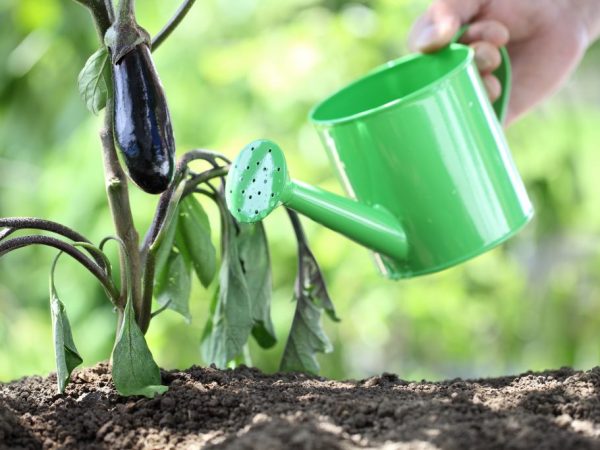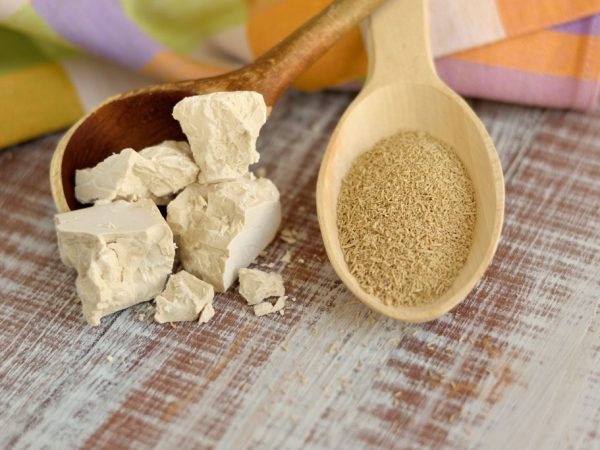The benefits of feeding eggplant with yeast
Feeding eggplants with yeast has a beneficial effect on the development of vegetable crops, activating the process of fruit formation and helping to increase yields.

The benefits of feeding eggplant with yeast
The benefits of eggplant yeast
The yeast contains a group of unicellular fungal organisms, the vital activity of which is associated with an environment rich in organic matter. All yeast mass consists of ¾ of water and ¼ of dry elements, including:
- minerals, macro- and microelements: phosphoric acid, iodine, potassium, calcium, copper, iron, zinc;
- carbohydrates - polysaccharides;
- saturated and polyunsaturated fatty acids;
- proteins - amino acids;
- nitrogen;
- vitamins B, H, E.
The rich composition of the yeast mass makes it a useful food for eggplants, peppers and tomatoes. She:
- activates the vegetative growth of vegetable crops, saturating the soil with bacteria necessary for the plant,
- stimulates the processes of root formation, increasing the mass of the root system,
- increases endurance, having a beneficial effect on plant immunity,
- shortens the survival time of seedlings.
Preparation of yeast feeding solution
It is possible to feed eggplants and peppers with solutions with yeast of any kind, including fresh, pressed and dry. In the absence of ready-made nutritional yeast for the preparation of top dressing, it is permissible to use products containing them, including crackers and bread.
Recipes
There are several common recipes for yeast feeding:
- 1.5 tsp yeast mass and 1 tbsp. l. sugar is poured into 5 liters of warm water and 3 chacha is insisted. The ready-to-use infusion is diluted at the rate of 1 liter per 5 liters of water.
- 50 g of yeast is dissolved in 250 ml of water, the volume is brought to 5 l and placed under the plants immediately after preparation.
- 50 g of yeast is diluted with 5 liters of warm water, mixed with 250 g of wood ash and immediately after cooking, eggplants and peppers are fed.
- 10 l of chopped greens, 0.5 kg of fresh yeast mass are placed in a 70 l barrel and left to ferment for a day. The liquid is used for watering, it is suitable for mass planting of eggplants in a large garden.
- 30 g of fresh yeast mass, 50 ml of an extract from horse manure or chicken droppings, 400 ml of wood ash, 5 tbsp. l. sugar is diluted with 10 liters of warm water. The working solution for irrigation is diluted with water in a ratio of 1:10.

Any kind of yeast is suitable for the preparation of fertilizer.
Vegetable infusions from weeds, tree foliage and potato tops are added to the composition of feeding for seedlings and adult eggplants, which increases the effectiveness of the beneficial effect of yeast fertilization on the development of vegetable crops. Mixing in hoppy vines causes an intensified fermentation process and releases more nitrogen.
Terms of feeding
Initially, eggplants are fed with yeast solutions after 7-10 days after transplanting the seedlings into open soil or into a greenhouse.The norm for applying yeast fertilizers is 0.5 liters of ready-made working solution for each plant.
After a short period of time after the yeast feeding, the eggplant bushes increase in size, actively gaining leaf mass, the foliage acquires a bright color and becomes larger.
The second eggplant yeast feeding falls on the time before flowering. The rate of yeast fertilization is 1.5 liters for each plant.
Subtleties of application
The use of yeast bait has a number of features:
- it is carried out as additional stimulation in the presence of weak eggplant bushes, which allows you to give strength to wilted plants,
- the effectiveness of the action of yeast increases in warm conditions, therefore solutions based on them are recommended to be introduced into a well-heated soil soil,
- in the process of the life of yeast fungi in the soil, calcium and potassium are consumed, to restore the balance of which fertilizer complexes containing these components are additionally introduced in poor soil for these elements, or they use solutions in the recipes of which wood ash is present,
- yeast mixtures, when used as top dressing, additionally act as a means of combating gray rot on seedlings.
Conclusion
Yeast bait for eggplants and peppers is an irreplaceable additional food designed to accelerate the growth and development of vegetable crops. Usually it is performed twice a season, but more frequent use is permissible for the purpose of additional stimulation. The working solution is prepared according to one of the available recipes. The addition of vegetable greens increases the effectiveness of the yeast bait.


